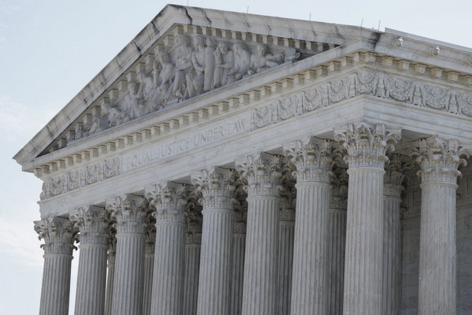Trump wants the Supreme Court to let him fire officials despite the law. That's unprecedented
Published in Political News
Less than a month into Donald Trump’s second term, a case involving his extreme claims of presidential power has already made it to the Supreme Court. It raises a question of profound importance: Can the president fire anyone who works in the executive branch even when a law limits his power to do so?
To side with Trump and grant him that authority, the court would have to overrule long-standing precedents and adopt a radical theory of presidential power.
The case involves Hampton Dellinger, the head of the Office of Special Counsel, an independent agency responsible for protecting whistleblowers and enforcing ethics laws. Dellinger was appointed to a five-year term by President Joe Biden and confirmed by the Senate last year. The law governing the office says that until the expiration of that term, the special counsel “may be removed by the president only for inefficiency, neglect of duty, or malfeasance in office.”
Dellinger was nevertheless fired on Feb. 7 with a one-sentence email that gave no reasons for the dismissal. Nor has the government cited any cause for removing him in its filings. Rather, the Trump administration claims that it is unconstitutional for Congress to limit the removal of executive officials by statute.
This assertion is inconsistent with decades of Supreme Court decisions. In the 1935 case Humphrey’s Executor v. United States, the court unanimously upheld a federal statute preventing removal of members of the Federal Trade Commission without just cause. The justices stressed that Congress must be able to shield federal regulatory agencies from direct presidential control.
The court reaffirmed this in many subsequent cases. In 1988, in Morrison v. Olson, the court upheld the constitutionality of the law that allowed independent counsels to be appointed to investigate allegations of wrongdoing by high-level executive branch officials, which also protected them from dismissal without cause. In a 7-1 decision authored by Chief Justice William H. Rehnquist, the court emphasized the importance of the counsel’s independence from the president given the position’s duties.
The Supreme Court further clarified these principles and even addressed the office held by Dellinger in a 2020 case, Seila Law LLC v. Consumer Financial Protection Bureau. The court held 5-4 that Congress could not limit the removal of the head of an independent regulatory agency directed by a single person, such as the Consumer Financial Protection Bureau, but could do so in the case of a multimember body, such as the Federal Trade Commission.
Chief Justice John G. Roberts Jr., writing for the majority, also contrasted the Office of Special Counsel with the agency at issue in that case, writing that Dellinger’s office “exercises only limited jurisdiction to enforce certain rules governing Federal Government employers and employees. … It does not bind private parties at all or wield regulatory authority comparable to the CFPB.” The court indicated that Congress could therefore limit the president’s ability to fire officials in Dellinger’s position.
The Trump administration is arguing that Humphrey’s Executor and Morrison v. Olson should be overruled and that Congress never should be able to limit the firing of anyone who works in the executive branch. Acting Solicitor General Sarah M. Harris wrote in a letter to Sen. Dick Durbin of Illinois, the ranking Democrat on the Judiciary Committee, that the Department of Justice has concluded that legal limits on removal are unconstitutional and that it won’t defend them in court. Trump has violated many federal laws by firing not just Dellinger but also members of the National Labor Relations Board, the Equal Employment Opportunity Commission and the Federal Election Commission. In the administration’s very expansive view, even civil service protections dating to 1883 are unconstitutional.
The administration is relying on an extreme view of presidential power known as the unitary executive theory, which purports that Congress cannot regulate the operation of the executive branch of government in any way. This view has no historical support: The framers of the Constitution were deeply distrustful of executive authority. The theory ignores the fact that federal powers are both separate and interdependent, as well as the importance of checks and balances within the government.
Protecting executive branch officials from unchecked presidential power can be very desirable. It is widely accepted, for example, that the Federal Reserve Board, which has enormous influence over the economy, should not be directly answerable to the president. It likewise makes sense that the person handling whistleblower complaints against the government should have protection from removal.
It’s quite possible that the Supreme Court will not hear Trump’s appeal in the Dellinger case as quickly as the administration has asked. A federal district court followed the law and issued a temporary restraining order keeping Dellinger in office for two weeks. The U.S. Court of Appeals for the District of Columbia held that it could not review the order, recognizing that temporary restraining orders are generally not reviewable on appeal, including by the Supreme Court.
But whether in this case or another, the issue surely will be before the Supreme Court soon. The justices will have to decide whether to abide by long-standing, well-founded precedents — or give the president vast new powers that would threaten a host of government officials granted a measure of independence by law.
____
Erwin Chemerinsky, a contributing writer to Opinion, is dean of the UC Berkeley Law School.
©2025 Los Angeles Times. Visit at latimes.com. Distributed by Tribune Content Agency, LLC.




























































Comments